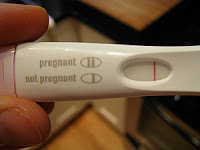Why does no one tell young women about the challenges of infertility?
In an article on NBC’s Today Show site, experts cite some interesting stats about women and their knowledge of their own fertility. According to RESOLVE, a National Infertility Association, most women have been misinformed, or under informed, about the facts of a woman’s reproductive system and the realistic amount of time in a woman’s lifetime that she has to become pregnant. An expert quoted in the article says that by the time women seek fertility help they have literally “run out of time.”
Let’s be clear, here. I don’t think that ANY woman should have a child before she is ready. If she has a list of life goals she wants to accomplish before bringing a baby into the world, she should do that. I’m not saying we should all have babies when we are younger — I’m saying that we should know what waiting actually means and how it can contribute to the challenges of infertility.
Here’s a little quiz with questions that were actually on a RESOLVE survey of 1,000 woman, ages 25 – 35. Test yourself then read the answers below.
Survey questions:
1. What percentage of chance does a healthy thirty-year-old woman have in conceiving?
2. What percentage of chance does a healthy forty-year-old woman have?
3. How many months on average does it take a twenty-year-old to conceive?
Answers:
1. 20 % (that’s it!); Survey responders said 70%.
2. 5%; Survey responders said 60%.
3. Five months; Survey responders said two months.
Challenges of Infertility Stem from Lack of Knowledge
So where is the disconnect here? How can we as women, who often know when our monthly friend is going to arrive to the minute, not know these basic facts about our own procreation and find ourselves dealing with the challenges of infertility?
The article is quick to blame older celebrity mothers like Selma Hayek (had baby at 41), Holly Hunter (twins at 47) and Mariah Carey (twins at 41) for the spike in why women believe that they have more time than they actually do. I’m not sure the celebrities are the problem, though. Never once in my life have I seen something that Mariah Carey has done and said, “Oh, okay. So that’s how real life goes.” I’d say that it’s generally assumed, even by very young women, that celebrities live a different sort of life than the average Jill and have access to a lot more medical opportunities than the rest of us.
I believe that the fertility misconception problem starts at the core of pregnancy education, whether the information is passed from mother to daughter or doled out in sex education class. The contemporary message about having children is overwhelmingly clear: you have lots of time to have babies. Live your life first. Go to college. Live out your twenties independently. Get married. Be “a couple” for several years before thinking about adding kids. Take promotions at work. Be sure that you can survive on one income, pay the mortgage on a home and still have a little extra to take a trip here or there before pitching the birth control. Get yourself to a “good place” and make sure you “have it all” before you even think about bringing another life into the world.
Is it any wonder, really, that women who wander into a fertility clinic at 37 or 38 years old are surprised to learn that they have less than a 10% chance to carry a child? Many women who have put their dream of having children on the back burner while they crossed off every single other goal on their life list find that their dream of nurturing a family has a slim chance of becoming a reality. The challenges of infertility are real – and should be discussed before it is too late.
There is big difference between an informed woman who chooses to wait on becoming pregnant and one who simply assumes that she can cash in her mommy card whenever she gets around to it.
The facts of fertility should be discussed in sex education classes. It is a bodily function, indeed a vital one. If parents would rather this not be a discussion that a teacher have with their daughters (or sons), then they should have access to the material themselves. This is something pediatricians should discuss with older teenagers and their parents. OBs need to talk facts with young women in their 20s. I don’t mean that the conversation about having children should be completely reversed to scare women into starting families earlier than they are comfortable with. I just mean that the facts on fertility need to be out there. The only real choice about anything in life is an informed one and the challenges of infertility are tough to cope with.
What do you think? How much do you/did you truly know about your fertility? Men — how much did you learn about fertility, or did you just leave it up to your significant other to keep you informed?
First time here? Like Mumbling Mommy on Facebook to continue the conversation!
Category: HealthTags: education









